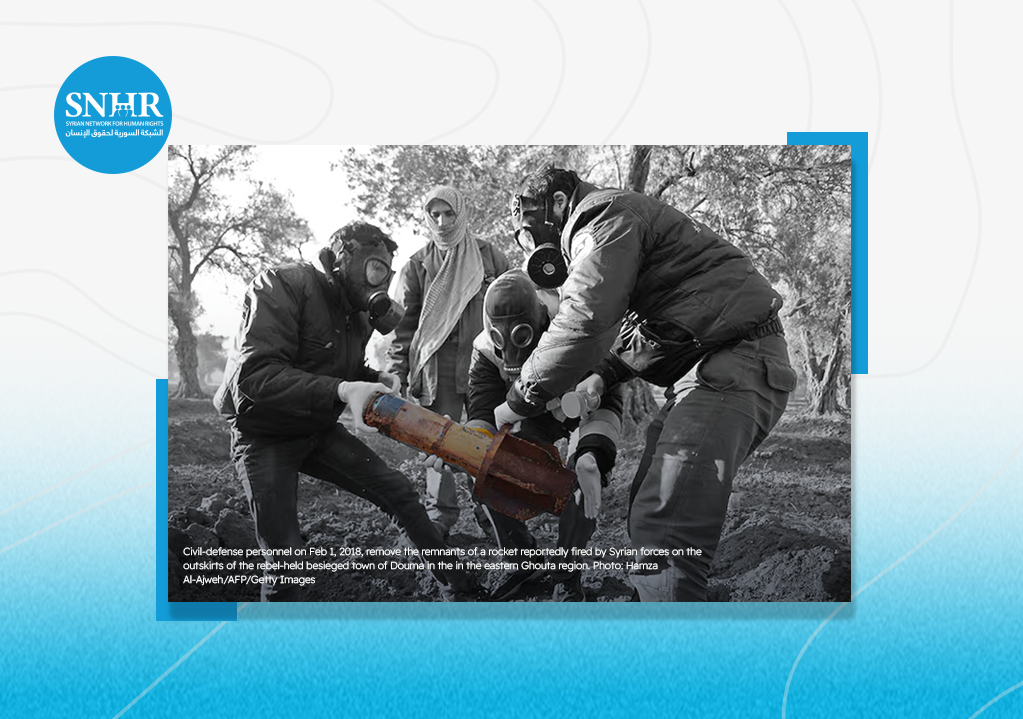The OPCW Team Must be Granted Immediate Access to Syria

Available In
The Hague – The Syrian Network for Human Rights (SNHR) today released a statement calling on the new Syrian government to fully cooperate with the Organization for the Prohibition of Chemical Weapons (OPCW) to reveal all the remaining chemical weapons sites in Syria, and ensure that these weapons are properly and conclusively destroyed in order to ensure that they can never again be used.
The statement stresses that chemical weapons, which remain a horrifying symbol of the Assad regime’s criminality, have posed a lethal threat to civilians across Syria, killing or injuring thousands over the past 13 years. As SNHR’s database attests, 222 attacks involving the use of chemical weapons were carried out in Syria during that period, from the first documented use of chemical weapons in the country on December 23, 2012, up until November 30, 2024. The Assad regime was responsible for 98 percent of these attacks, killing 1,514 individuals, including 214 women and 262 children, and injuring over 12,000 others.
The statement underlines the urgent need for the new Syrian government to comply with the international laws and treaties prohibiting the use, production, and stockpiling of chemical weapons. The statement outlines the most prominent of these legal frameworks:
- Chemical Weapons Convention (CWC): Although Syria ratified the CWC in 2013 following the Ghouta chemical attack, the Assad regime continued to use chemical weapons in numerous attacks after that point.
- International humanitarian law: This prohibits the use of chemical weapons against civilians, which is considered a war crime under international law.
- UN Security Council resolutions: The UN Security Council has adopted several resolutions demanding the destruction of Syria’s chemical weapons, most notably resolution 2118 (2013).
The statement also outlines a number of recommendations
Organization for the Prohibition of Chemical Weapons (OPCW)
- Promote coordination with the new Syrian government to ensure access to suspected chemical weapons sites, and immediately launch the process of destroying all remaining chemical weapons stockpiles.
- Ensure full and complete transparency in inspection and assessment processes with regard to chemical weapons in Syria. This should include issuing periodic reports outlining the progress made and challenges faced.
New Syrian government
- Fully comply with the international legal frameworks that prohibit the use of chemical weapons, including the CWC.
- Fully cooperate with the OPCW to facilitate access to suspected chemical weapons site for the OPCW’s inspection teams, and ensure the full disposal of the remaining stockpile.
- Promote national transparency by releasing periodic reports outlining the steps taken to dispose of chemical weapons and ensure that the Syrian people and international community are aware of the progress being made.
- Cooperate with Syrian civil society, by involving civil society groups in monitoring and documenting the stages of the disposal of chemical weapons to ensure transparency and credibility, and build trust with the people.
Provide support for affected families and Syrian society generally, by committing to developing plans to compensate and rehabilitate those affected by chemical attacks, which should include long-term medical and psychological support programs, and the rehabilitation of the areas affected from an environmental and public health perspective.
International community
- Support the efforts of the OPCW in monitoring the issue of chemical weapons disposal in Syria, and ensure full and complete transparency in all implementation stages.
- Call on the new Syrian government to swiftly act to destroy all prohibited chemical weapons as part of its international obligations.
- Establish comprehensive reparation mechanisms that ensure justice for victims of chemical weapons attacks, including offering financial compensation, and psychological and physical support for the victims and their families.


